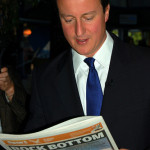100 things we learned about democracy in 2013: Part four
To mark the end of 2013, Democratic Audit has collected 100 of the most important, surprising and downright disturbing things we have learned about democracy this year. Here is part four of our list, covering everything from Parliamentary select committees to Cornish national identity.
76. Dog ownership does influence people in deciding how to vote, at least in the US. Find out more here.
77. The political party name ‘National Liberal’ – or at least something so close as to be near indistinguishable – is already registered with the Electoral Commission. Find out more here.
78. Labour’s former Campaigns Chief thinks that MPs ought to spend more time in muddy fields listening to bands. Find out more here.
79. Only around half of MPs were born within the region they represent in Parliament. Find out more here.
80. Parliamentary Select Committees are paid a great deal more attention in the media than they used to be. Find out more here.
81. The House of Lords is more diverse than the Commons in its party membership and more representative of the public’s political preferences. Find out more here.
82. The Government payroll vote is huge, at its very limits, and bad for democracy. Find out more here.
83. Online misogyny prevents women from participating fully in democracy. Find out more here.
84. There have been more Government “Tsars” appointed by this Government than any previously. Find out more here.
85. Online voting is faster and cheaper – but it doesn’t increase turnout. Find out more here.
86. If people start voting young, they tend to stay in the habit. Find out more here.
87. Online political discussions are more civil when they take place on Facebook. Find out more here.
88. In England, only 23% of council Chief Executives are women, and 12% of Council Leaders. Find out more here.
89. Just 41% of the public now say that in the event of an immediate general election they would be certain to vote. Find out more here.
90. Female politicians receive less attention in the press now than they did 20 years ago. Find out more here.
91. 350 Parliamentary constituencies have never elected a female MP. Find out more here.
92. Despite the (heeded) vote in Parliament against military involvement in Syria, the UK Parliament still has relatively weak war powers. Find out more here.
93. Something called the ‘Osmotherly Rules’ is a barrier to better Select Committee scrutiny of Government. Find out more here.
94. Rain doesn’t effective voter turnout… in Sweden, at least. Find out more here.
95. The proportion of people who self-identify as Cornish doubled in the decade after 2001. Find out more here.
96. Membership of the Green Party increased by a greater amount than that of UKIP between 2008 and 2012. Find out more here.
97. Prince Charles has had 35 private, unminuted meetings with Ministers since 2010. Find out more here.
98. The A List helped increase the number of female Conservative MPs, but had little effect on race and class composition of the Conservative parliamentary party. Find out more here.
99. British political fiction depicts our elected representatives as both powerless and self-interested. Find out more here.
100. 46 per cent of the top 50 publicly traded firms have a British MP as a director or shareholder. Find out more here.
—
View the full 100 things we learned about democracy in 2013 series here.
Note: This post represents the views of the authors and does not give the position of Democratic Audit or the LSE. Please read our comments policy before commenting. Shortlink for this post: buff.ly/19gZfIK
—
Photo credits:
Dogs: Kemal Y, CC by ND 2.0
Laptops: Colemama, CC by 2.0
Facebook: Scott Beale, CC by 2.0
David Cameron: star one, CC by 2.0
Cover photo HiMY SYeD / photopia, CC by 2.0









 Democratic Audit's core funding is provided by the Joseph Rowntree Charitable Trust. Additional funding is provided by the London School of Economics.
Democratic Audit's core funding is provided by the Joseph Rowntree Charitable Trust. Additional funding is provided by the London School of Economics.
@UKIP hail rising memb but what it doesn’t say is @democraticaudit figure showing @TheGreenParty having quicker rise https://t.co/OQoLjWHgzT
@BBCPolitics But not as quickly as has @thegreenparty’s membership. See no 96 of @democraticaudit’s ‘100 things’ list https://t.co/Ivm6X5NX7t
RT @Bob__Hudson: 46 per cent of the top 50 publicly traded firms have a British MP as a director or shareholder. https://t.co/cmKFgQOcz7
“Membership of the Green Party increased by a greater amount than that of UKIP between 2008 and 2012.” https://t.co/PFqtzsa6LU
RT @JeremyCliffe: Would love to know response of Peter Bone et al to this: Green Party has grown faster than UKIP since 2008 https://t.co/Kh…
RT @democraticaudit: Party leaders sould listen to music in muddy fields (via @tom_watson)… and 99 other things we learned this year http…
The final installment on what we learned about democracy in 2013 https://t.co/7KXaKrki8I
RT @natalieben: RT @democraticaudit: 100 things we learned ’13, #96: Membership of @TheGreenParty has increased quicker than UKIP’s http:/…
RT @democraticaudit: 100 things we learned in 2013, #96: Membership of @TheGreenParty has increased quicker than that of UKIP since 2008 ht…
100 things we learned about democracy in 2013, #83: Online misogyny prevents female participation (@everydaysexism) https://t.co/c4UwuMJ4gO
Part Four: What did we learn about democracy in 2013? https://t.co/7KXaKrki8I
Number of tsars like @maryportas has increased dramatically… and 99 other things we learned about democracy in 2013 https://t.co/c4UwuMJ4gO
Astonishing 46 per cent of the top 50 publicly traded firms in UK had a British MP as a director or shareholder. https://t.co/ton1l7ja23
Democratic Audit, final part of their brilliant list of “100 things we learned about UK democracy in 2013” https://t.co/ton1l7ja23
100 things we learned about democracy in 2013: Part four https://t.co/HpvWrpBYLx